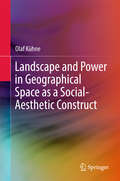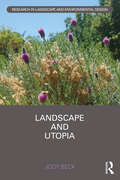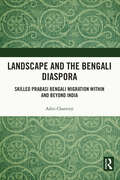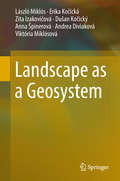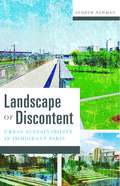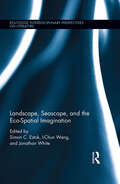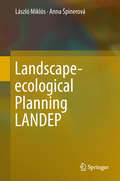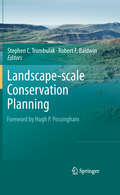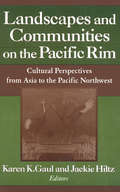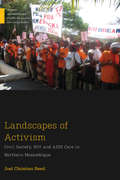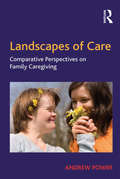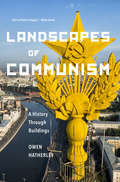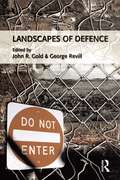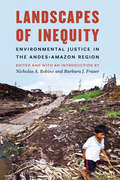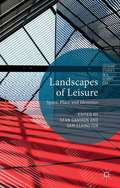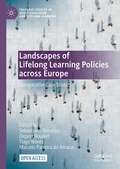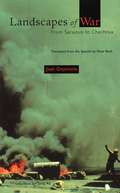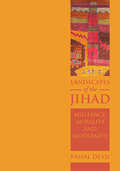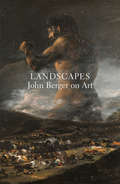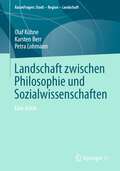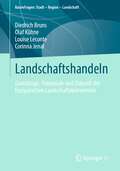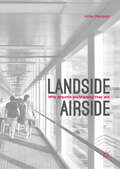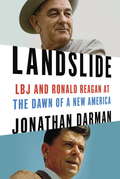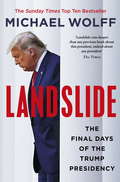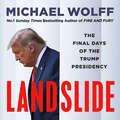- Table View
- List View
Landscape and Power in Geographical Space as a Social-Aesthetic Construct
by Olaf KühneThis book examines the power definiteness of landscape from a social constructivist perspective with a particular focus on the importance of aesthetic concepts of landscape in development. It seeks to answer the question of how societal notions of landscape emerge, how they are individually updated and how these ideas affect the use and design of physical space. It also analyzes how physical manifestations of societal activity impact on understandings of individual and societal landscapes and addresses the essential aspect of the social construction of landscape, cultural specificity, which in turn is discussed in the context of the expansion of a western landscape concept. The book offers an unprecedented, comprehensive and detailed examination of societal power relations in the context of landscape development. The numerous case studies from the physical manifestation of modern spatial planning in the United States, the power discourses concerning the design of model railway landscapes, and the medial production of stereotypical landscape notions shed light on the complex and multilayered interactions of collective and individual landscape references. It is a valuable resource for geographers, sociologists, landscape architects, landscape planners and philosophers.
Landscape and Utopia (Routledge Research in Landscape and Environmental Design)
by Jody BeckThis book examines three landmark utopian visions central to 20th century landscape architectural, planning, and architectural theory. The period between the 1890s and the 1940s was a fertile time for utopian thinking. Significant geographic shifts of large populations; radically altered relations between capital and labor; rapid technological developments; large investments in transportation and energy infrastructure; and repetitive economic disruptions motivated many individuals to wholly reimagine society – including the connections between social relations and the built environment. Landscape and Utopia examines the role of landscapes in the political imaginations of the Garden City, the Radiant City, and Broadacre City. Each project uses landscapes to propose a reconstruction of the relationships between land, labor, and capital but - while the projects are well-known – the role played by landscapes has been largely left unexamined. Similarly, the radical anti-capitalism that underpinned each project has similarly been, for the most part, left out of contemporary discussions. This book sets these projects within a historical and philosophical context and opens a discussion on the role of landscapes in society today. This book will be a must-read for instructors, students, and researchers of the history and theory of landscape architecture, planning, and architecture as well as utopian studies, cultural and social history, and environmental theory.
Landscape and the Bengali Diaspora: Skilled Prabasi Bengali Migration within and beyond India
by Aditi ChatterjiBengalis have been great travellers for centuries and are famous for recreating their way of life wherever they go. This book critically analyses skilled Bengali migration within and beyond India and looks at landscapes created by the Bengali diaspora beyond the terrain of their homeland, ranging from those of nostalgia and imagination (Durga Puja/Saraswati Puja) to those of subjugation and loss of identity. This book demonstrates the relationship between landscape and diaspora in terms of perception, imagination, space and place, ethnicity, race, caste, and class. With case studies from Delhi, Mumbai, Bengaluru, Dehra Dun, Oxford, Aberdeen, New York, and the Bay Area (USA), it brings together themes like evolution of the Bengali diaspora, transnationalism and identity, stratification and segregation, urban social space, adaptation and assimilation, and questions of discrimination from other communities. Drawing on ethnographic accounts of over 300 skilled Bengalis, the book will be an essential read for scholars and researchers of diaspora studies, urban studies, ethnic studies, migration studies, geography, sociology, history, and political studies.
Landscape as a Geosystem
by László Miklós Anna Špinerová Erika Kočická Zita Izakovičová Dušan Kočický Andrea Diviaková Viktória MiklósováThe book analyses the landscape as a geosystem in all its complexity (from the abiotic environment, and land use to socio-economic character) as an integrated natural resource, as society’s life space, as well as an object of planning and decision making on sustainable land use. It presents the landscape properties in the form of databases that comply with the INSPIRE Directive 2007/2/EC (INSPIRE – Infrastructure for Spatial InfoRmation in Europe) requirements, which can be used for a variety of purposes and can serve as a national spatial information database for the needs of applied landscape-ecological research and real-world spatial planning processes. The book also provides overview legends with complete domain values of selected attributes of all three landscape structures (primary, secondary and tertiary) routinely used in Slovakia. Lastly, the book offers an example of the construction and mapping of geocomplexes as well as the database creation on the model territory at the regional level.
Landscape of Discontent: Urban Sustainability in Immigrant Paris (A Quadrant Book)
by Andrew NewmanOn a rainy day in May 2007, the mayor of Paris inaugurated the Jardins d&’Éole, a park whose completion was hailed internationally as an exemplar of sustainable urbanism. The park was the result of a hard-fought, decadelong protest movement in a low-income Maghrebi and African immigrant district starved for infrastructure, but the Mayor&’s vision of urban sustainability was met with jeers. Drawing extensively from immersive, firsthand ethnographic research with northeast Paris residents, as well as an analysis of green architecture and urban design, Andrew Newman argues that environmental politics must be separated from the construct of urban sustainability, which has been appropriated by forces of redevelopment and gentrification in Paris and beyond. France&’s turbulent political environment also provides Newman with powerful new insights into the ways in which multiethnic coalitions can emerge⎯even amid overt racism and Islamophobia⎯in the struggle for more just cities and more inclusive societies. A tale of multidimensional political efforts, Landscape of Discontent cuts through the rhetoric of green cities to reveal the promise that environmentalism holds for urban communities anywhere.
Landscape, Seascape, and the Eco-Spatial Imagination (Routledge Interdisciplinary Perspectives on Literature)
by Jonathan White Simon C. Estok I-Chun WangWritten from within the best traditions of ecocritical thought, this book provides a wide-ranging account of the spatial imagination of landscape and seascape in literary and cultural contexts from many regions of the world. It brings together essays by authors writing from within diverse cultural traditions, across historical periods from ancient Egypt to the postcolonial and postmodern present, and touches on an array of divergent theoretical interventions. The volume investigates how our spatial imaginations become "wired," looking at questions about mediation and exploring how various traditions compete for prominence in our spatial imagination. In what ways is personal experience inflected by prevailing cultural traditions of representation and interpretation? Can an individual maintain a unique and distinctive spatial imagination in the face of dominant trends in perception and interpretation? What are the environmental implications of how we see landscape? The book reviews how landscape is at once conceptual and perceptual, illuminating several important themes including the temporality of space, the mediations of place that form the response of an observer of a landscape, and the development of response in any single life from early, partial thoughts to more considered ideas in maturity. Chapters provide suggestive and culturally nuanced propositions from varying points of view on ancient and modern landscapes and seascapes and on how individuals or societies have arranged, conceptualized, or imagined circumambient space. Opening up issues of landscape, seascape, and spatiality, this volume commences a wide-ranging critical discussion that includes various approaches to literature, history and cultural studies. Bringing together research from diverse areas such as ecocriticism, landscape theory, colonial and postcolonial theory, hybridization theory, and East Asian Studies to provide a historicized and global account of our ecospatial imaginations, this book will be useful for scholars of landscape ecology, ecocriticism, physical and social geography, postcolonialism and postcolonial ecologies, comparative literary studies, and East Asian Studies.
Landscape-ecological Planning LANDEP
by László Miklós Anna ŠpinerováThis book provides a comprehensive description of the landscape-ecological planning system LANDEP, and introduces the methodical procedure. LANDEP was developed at the Institute of Landscape Ecology of Slovak Academy of Sciences in Bratislava and has been applied in various planning processes at home and abroad. Despite the fact that the LANDEP methodology was defined in 1979, the methodological content, sequence of procedures and the application of concept in practice are still valid. The first two steps – analyses and syntheses – have the nature of fundamental research and result in the design and characteristics of complex landscape-ecological-spatial units. The final two steps – evaluations and proposals – address the needs of planning practice. The intermediate step – interpretations – has the character of applied research and forms the arguments and criteria for the assessment of landscape for its utilisation by humans.
Landscape-scale Conservation Planning
by Robert Baldwin Stephen C. TrombulakThis book applies the latest thinking and techniques of systematic conservation planning to the issues that arise in protecting ecosystem pattern and process in human-dominated landscapes such as seascapes, multiple countries and conservation targets.
Landscapes and Communities on the Pacific Rim: From Asia to the Pacific Northwest (A\study Of The Maureen And Mike Mansfield Center Ser.)
by Karen K. Gaul Jackie HiltzThese essays offer a cross-cultural and cross-disciplinary study of the ways in which communities of people understand and inhabit their environments. They examine and compare human/environmental interactions in communities across the Pacific Northwest, the Pacific Rim, and Asia.
Landscapes of Activism: Civil Society, HIV and AIDS Care in Northern Mozambique (Medical Anthropology)
by Joel Christian ReedAIDS activists are often romanticized as extremely noble and selfless. However, the relationships among HIV support group members highlighted in Landscapes of Activism are hardly utopian or ideal. At first, the group has everything it needs, a thriving membership, and support from major donors. Soon, the group undergoes an identity crisis over money and power, eventually fading from the scene. As government and development institutions embraced activist demands—decentralizing AIDS care through policies of health systems strengthening—civil society was increasingly rendered obsolete. Charting this transition—from subjects, to citizens, and back again—reveals the inefficacy of protest, and the importance of community resilience. The product of in-depth ethnography and focused anthropological inquiry, this is the first book on AIDS activists in Mozambique. AIDS activism’s strange decline in southern Africa, rather than a reflection of citizen apathy, is the direct result of targeted state and donor intervention.
Landscapes of Care: Comparative Perspectives on Family Caregiving
by Andrew PowerGiven the increasing shift of care from state residential services to community-based support, this book examines the complex geographies of family caregiving for young adults with intellectual disabilities. It traces how family ’carers’ are directly and indirectly affected by a broad array of law and policy, including family policy, disability legislation, and health and community care restructuring policy. Each of these has material and institutional effects and is premised on the discourses, ideologies, and interactions in the state over time. Focusing on the welfare models of England, the US and Ireland, this book compares the welfare ideologies in each country and examines how the specific historical, cultural, and political contexts give rise to different landscapes of care and disability. Further, the book explores the unique lifeworlds of family carers of young adults with intellectual disability within the broader landscape of care in which they are situated.
Landscapes of Communism
by Owen HatherleyWhen communism took power in Eastern Europe it remade cities in its own image, transforming everyday life and creating sweeping boulevards and vast, epic housing estates in an emphatic declaration of a noncapitalist idea. The regimes that built them are now dead and long gone, but from Warsaw to Berlin, Moscow to postrevolutionary Kiev, the buildings remain, often populated by people whose lives were scattered by the collapse of communism.Landscapes of Communism is a journey of historical discovery, plunging us into the lost world of socialist architecture. Owen Hatherley, a brilliant, witty, young urban critic shows how power was wielded in these societies by tracing the sharp, sudden zigzags of official communist architectural style: the superstitious despotic rococo of high Stalinism, with its jingoistic memorials, palaces, and secret policemen's castles; East Germany's obsession with prefabricated concrete panels; and the metro systems of Moscow and Prague, a spectacular vindication of public space that went further than any avant-garde ever dared. Throughout his journeys across the former Soviet empire, Hatherley asks what, if anything, can be reclaimed from the ruins of Communism-what residue can inform our contemporary ideas of urban life?
Landscapes of Defence
by George Revill John R. GoldThis is a key text on the very topical themes of power, defence and space. Landscapes of Defence is an exciting collection of theoretical and empirical material from very well known contributors, desiged to help students understand how landscapes of defence fit in with some of the broader concepts of space, power and place to which they are introduced in the 1st year. The book is split into four sections, and each section contains an introduction placing the subsequent chapters in context. There is also a comprehensive introduction and afterword to tie the book's broad themes together. 2nd and 3rd year undergraduates in urban and cultural geography will be the key market for this title, as well as strong secondary market in departments of Sociology, Anthropology, Law and Planning.
Landscapes of Inequity: Environmental Justice in the Andes-Amazon Region
by Nicholas A. Robins Barbara J. FraserThe natural wealth of the Amazon and Andes has long attracted fortune seekers, from explorers, farmers, and gold panners to multimillion-dollar mining, oil and gas, and timber operations. Modern demands for commodities have given rise to new development schemes, including hydroelectric dams, open cast mines, and industrial agricultural operations. The history of human habitation in this region is intimately tied to its rich biodiversity, and the Amazon basin is home to scores of indigenous groups, many of whom have populations so small that their cultural and physical survival is endangered.Landscapes of Inequity explores the debate over rights to and use of resources and addresses fundamental questions that inform the debate in the western Amazon basin, from the Andes Mountains to the tropical lowlands. Beginning with an examination of the divergent conceptual interpretations of environmental justice, the volume explores the issue from two interlocking perspectives: of indigenous peoples and of economic development in a global economy. The volume concludes by examining the efficacy of laws and policies concerning the environment in the region, the viability and range of judicial recourse, and future directions in the field of environmental justice.
Landscapes of Leisure
by Sean Gammon Sam ElkingtonThe leisure landscape is a complex and diverse one that is both natural and built, dark and light, safe and dangerous, contained or without boundary, and profoundly influences the manner in which leisure is performed and experienced. These leisurescapes are increasingly becoming significant sites for the construction of individual and shared frameworks in which people orient themselves and act in wider society. Drawing on international contributions by leading researchers in the field, this collection aims to map out the complex relationship that leisure has with place. A key element of the volume will be to illustrate the transdisciplinarity of this key feature of leisure studies, and by doing so offer, for the first time, a more rounded and inclusive approach to the study of leisure and place. It also aims to explore and elucidate the extent to which leisure places and spaces form, affect and influence personal, social and collective identities.
Landscapes of Lifelong Learning Policies across Europe: Comparative Case Studies (Palgrave Studies in Adult Education and Lifelong Learning)
by Marcelo Parreira do Amaral Sebastiano Benasso Dejana Bouillet Tiago NevesThis open access book explores different landscapes of Lifelong Learning policies (LLP), producing case-based examinations of their institutional, discursive, and relational dimensions. Across Europe, young people develop their life courses amidst diverse living conditions and are confronted with a variety of institutional and structural arrangements that impact on their opportunities in education and labour. Considering the relevance of LLP in shaping those opportunities, the chapters draw from multi-level, mixed-methods research and offer original insights on the interplay of discourses and governance patterns in the processes of policy-making and deliverance. The book yields noteworthy insights into the widely differing realities across the European landscape, and also into the diverging ways young people deal with and actively participate in LLP.
Landscapes of War: From Sarajevo to Chechnya
by Juan Goytisolo Peter BushAn incisive examination of the tensions that exist between the West and Islamic societies of Europe, North Africa, and the Middle East. Provides rich historical analysis and reportage of life in four explosive war-zones: Sarajevo, Algeria, the West Bank and Gaza, and Chechnya. Translated by Peter Bush.
Landscapes of the JIHAD: Militancy, Morality, Modernity
by Faisal DevjiWhat are the motives behind Osama bin Laden's and Al-Qaeda's jihad against America and the West? Innumerable attempts have been made in recent years to explain that mysterious worldview. In Landscapes of the Jihad, Faisal Devji focuses on the ethical content of this jihad as opposed to its purported political intent. Al-Qaeda differs radically from such groups as Egypt's Muslim Brotherhood and Indonesia's Jemaah Islamiyah, which aim to establish fundamentalist Islamic states. In fact, Devji contends, Al-Qaeda, with its decentralized structure and emphasis on moral rather than political action, actually has more in common with multinational corporations, antiglobalization activists, and environmentalist and social justice organizations. Bin Laden and his lieutenants view their cause as a response to the oppressive conditions faced by the Muslim world rather than an Islamist attempt to build states.Al-Qaeda culls diverse symbols and fragments from Islam's past in order to legitimize its global war against the "metaphysical evil" emanating from the West. The most salient example of this assemblage, Devji argues, is the concept of jihad itself, which Al-Qaeda defines as an "individual duty" incumbent on all Muslims, like prayer. Although medieval Islamic thought provides precedent for this interpretation, Al-Qaeda has deftly separated the stipulation from its institutional moorings and turned jihad into a weapon of spiritual conflict. Al-Qaeda and its jihad, Devji suggests, are only the most visible manifestations of wider changes in the Muslim world. Such changes include the fragmentation of traditional as well as fundamentalist forms of authority. In the author's view, Al-Qaeda represents a new way of organizing Muslim belief and practice within a global landscape and does not require ideological or institutional unity. Offering a compelling explanation for the central purpose of Al-Qaeda's jihad against the West, the meaning of its strategies and tactics, and its moral and aesthetic dimensions, Landscapes of the Jihad is at once a sophisticated work of historical and cultural analysis and an invaluable guide to the world's most prominent terrorist movement.
Landscapes: John Berger on Art
by John BergerA major new work from the world's leading writer on artAs leading radical writer on art John Berger celebrates his ninetieth year, he brings a lifetime's engagement with the ideas, artists, and thinkers that have shaped his thinking: Walter Benjamin, Rosa Luxemburg and Bertolt Brecht among them. In Landscapes Berger allows us to see the evolution of his own way of seeing. He explores the relationship between creativity and politics and the revolutionary potential of art through a series of different forms.As always, in this book, Berger pushes at the limits of art writing, demonstrating beautifully how his painter's eyes lead him to refer to himself only as a storyteller. A landscape is, to John Berger, like a portrait, an animating, liberating metaphor rather than a rigid definition. Landscapes offers a tour of the history of art, but not as you know it.Landscapes brings together Berger's most penetrating insights into how we may engage with both art and the artist in society.From the Hardcover edition.
Landschaft zwischen Philosophie und Sozialwissenschaften: Eine Kritik (RaumFragen: Stadt – Region – Landschaft)
by Olaf Kühne Karsten Berr Petra LohmannDie Befassung mit ‚Landschaft‘ hat in den letzten Jahren in der Öffentlichkeit und den Wissenschaften an Bedeutung gewonnen. Verbunden war dies nicht vorwiegend mit den Konflikten, die sich in den letzten Jahren um physische Manifestationen der Verminderung von und Anpassung an den anthropogenen Klimawandel ergaben. In Philosophie und Sozialwissenschaften haben sich – nicht zuletzt ausgehend von einem gemeinsamen Bezugspunkt der ‚Philosophie der Landschaft‘ von Georg Simmel aus dem Jahre 1913 – unterschiedliche Traditionen im Umgang mit ‚Landschaft‘ entwickelt. Diese werden in dem vorliegenden Buch hinsichtlich ihrer Tauglichkeit einer Kritik unterzogen, Antworten auf die landschaftsbezogenen Herausforderungen der Gegenwart, sowohl in Bezug auf Wissenschaft, aber auch Gesellschaft zu leisten. Diese Kritik basiert auf einem eigens hierfür entwickelten kategorialen System, das sich zwischen den Dimensionen Konkretheit-Abstraktheit und wissenschaftsintern-wissenschaftsextern aufspannt. Zentrale herausgearbeitete Kritikpunkte sind neben einer unzureichenden Begriffsarbeit und einer ‚Individuenvergessenheit‘ beider Disziplinen auch die Reduzierung des Landschaftsbegriffs auf den Naturbegriff in der philosophischen Landschaftsforschung.
Landschaftshandeln: Grundzüge, Potenziale und Zukunft der Europäischen Landschaftskonvention (RaumFragen: Stadt – Region – Landschaft)
by Olaf Kühne Corinna Jenal Diedrich Bruns Louise LeconteDie von 40 Staaten unterzeichnete und 2004 in Kraft getretene Europäische Landschaftskonvention stellt ein zentrales Dokument der Befassung mit Landschaft dar. Es basiert in großen Teilen auf einer konstruktivistischen Vorstellung von Landschaft und stellt Menschen bei Erhaltung und Entwicklung von Landschaft in den Mittelpunkt. In diesem Buch befassen sich namhafte Autor*innen mit Fragen der rechtlichen, sozialen, politischen und planerischen Bedeutung der Konvention. Neben Fallbeispielen der Umsetzung in verschiedenen europäischen Ländern geht es auch um die Frage, warum Deutschland mit der Unterzeichnung der ELK zögert und wie sich eine Umsetzung in Deutschland gestalten könnte.
Landside | Airside: Why Airports Are the Way They Are
by Victor MarquezWhy do we love and hate airports at the same time? Have you been a victim of tiresome walks, congestion, long lines, invasive pat-downs, eternal delays and so on? Perhaps no other technological system has been challenged by continuously changing paradigms like airports. Think a minute on rail stations; think of how successful are the rail networks of the world in connecting nations, with just minimum security measures. Why aviation and airports are so radically different in this regard?In order to answer those questions the author embarks on a thorough revision of airport history and airport planning that in the end builds up a new theory about how airports are formed from the outset. Within its journey from the early airfield to the newest hubs of today, Dr. Marquez identifies for the first time the Landside–Airside boundary as the single most important feature that shapes an airport. In this sense, his finding challenges the “historical linearity” that, until today, used to explain a century of airports.From both an analytical and theoretical S&TS stance, Dr. Marquez assures that it is only when airports needed to be fully reinvented (LaGuardia, Dulles and Tampa) when they become transparent and we may be able to understand their lack of technological stability.
Landslide
by Jonathan DarmanIn politics, the man who takes the highest spot after a landslide is not standing on solid ground. In this riveting work of narrative nonfiction, Jonathan Darman tells the story of two giants of American politics, Lyndon Johnson and Ronald Reagan, and shows how, from 1963 to 1966, these two men--the same age, and driven by the same heroic ambitions--changed American politics forever. The liberal and the conservative. The deal-making arm twister and the cool communicator. The Texas rancher and the Hollywood star. Opposites in politics and style, Johnson and Reagan shared a defining impulse: to set forth a grand story of America, a story in which he could be the hero. In the tumultuous days after the Kennedy assassination, Johnson and Reagan each, in turn, seized the chance to offer the country a new vision for the future. Bringing to life their vivid personalities and the anxious mood of America in a radically transformative time, Darman shows how, in promising the impossible, Johnson and Reagan jointly dismantled the long American tradition of consensus politics and ushered in a new era of fracture. History comes to life in Darman's vivid, fly-on-the wall storytelling. Even as Johnson publicly revels in his triumphs, we see him grow obsessed with dark forces he believes are out to destroy him, while his wife, Lady Bird, urges her husband to put aside his paranoia and see the world as it really is. And as the war in Vietnam threatens to overtake his presidency, we witness Johnson desperately struggling to compensate with ever more extravagant promises for his Great Society. On the other side of the country, Ronald Reagan, a fading actor years removed from his Hollywood glory, gradually turns toward a new career in California politics. We watch him delivering speeches to crowds who are desperate for a new leader. And we see him wielding his well-honed instinct for timing, waiting for Johnson's majestic promises to prove empty before he steps back into the spotlight, on his long journey toward the presidency. From Johnson's election in 1964, the greatest popular-vote landslide in American history, to the pivotal 1966 midterms, when Reagan burst forth onto the national stage, Landslide brings alive a country transformed--by riots, protests, the rise of television, the shattering of consensus--and the two towering personalities whose choices in those moments would reverberate through the country for decades to come. Advance praise for Landslide "Jonathan Darman turns fresh eyes on two political giants of the late twentieth century, LBJ and Ronald Reagan. Landslide is full of surprises and new insights on these two presidents, and is written with flair. A delicious feast of a read."--Lesley Stahl"Masterly . . . In taking us back to a moment in American history when politics worked, Jonathan Darman provides a resonant reality check on a system that now seems all too dysfunctional. The intertwined stories of Lyndon Johnson and Ronald Reagan offer us a window on the intrinsic give-and-take that makes governing possible. Anyone who cares about politics, biography, and current affairs will find this a delightful and illuminating book."--Jon Meacham, author of Thomas Jefferson: The Art of Power "Jonathan Darman writes with power, sweep, vivacity, and humor. He is at once a gifted storyteller, a keen judge of character, and a genie of political insight. He gives us two giants, Lyndon Johnson and Ronald Reagan, in all their glory and human vanity, and takes us on a breathtaking thousand-day ride."--Evan Thomas, author of Ike's Bluff and The Wise MenFrom the Hardcover edition.
Landslide: The Final Days of the Trump Presidency
by Michael WolffTHE INSTANT SUNDAY TIMES BESTSELLER 'Landslide cuts deeper than any previous book about this president, indeed about any president' The Times'First there was Fire and Fury, then there was Siege, now there is Landslide. The third is the best of the three . . . Required reading' Guardian'Michael Wolff concludes his Trump trilogy - with the best book yet . . . Unforgettable' Telegraph'Wolff is the shrewdest chronicler of Trump' Sunday Times__________________________________________'We won. Won in a landslide. This was a landslide.'President Donald J. Trump, 6 January 2021Politics has given us some shocking and confounding moments but none have come close to the careening final days of Donald Trump's presidency: the surreal stage management of his re-election campaign, his audacious election challenge, the harrowing mayhem of the storming of the Capitol and the buffoonery of the second impeachment trial. But what was really going on in the inner sanctum of the White House during these calamitous events? What did the president and his dwindling cadre of loyalists actually believe? And what were they planning?Drawing on an exclusive and wide range of sources who took part in or witnessed Trump's closing moments, Michael Wolff finds the Oval Office more chaotic and bizarre than ever before, a kind of Star Wars bar scene. At all times of the day, Trump, hunched behind the Resolute desk, is surrounded by schemers and unqualified sycophants who spoon-feed him the 'alternative facts' he hungers to hear - about COVID-19, Black Lives Matter protests, and, most of all, his chance of winning re-election. In this extraordinary telling of a unique moment in history, Wolff gives us front row seats as Trump's circle of plotters whittles down to the most enabling and the least qualified - and the president overreaches the bounds of democracy, entertaining the idea of martial law and balking at calling off the insurrectionist mob that threatens the hallowed seat of democracy itself.Michael Wolff pulled back the curtain on the Trump presidency with his globally bestselling blockbuster Fire and Fury. Now, in Landslide, he closes the door on the presidency with a final, astonishingly candid tale.
Landslide: The Final Days of the Trump Presidency
by Michael WolffIncludes an introduction read by Michael Wolff, as well as archival recordings of speeches made by Rudy Giuliani, Sidney Powell, and Donald Trump.'We won. Won in a landslide. This was a landslide.'President Donald J. Trump, 6 January 2021Politics has given us some shocking and confounding moments but none have come close to the careening final days of Donald Trump's presidency: the surreal stage management of his re-election campaign, his audacious election challenge, the harrowing mayhem of the storming of the Capitol and the buffoonery of the second impeachment trial. But what was really going on in the inner sanctum of the White House during these calamitous events? What did the president and his dwindling cadre of loyalists actually believe? And what were they planning?Drawing on an exclusive and wide range of sources who took part in or witnessed Trump's closing moments, Michael Wolff finds the Oval Office more chaotic and bizarre than ever before, a kind of Star Wars bar scene. At all times of the day, Trump, hunched behind the Resolute desk, is surrounded by schemers and unqualified sycophants who spoon-feed him the 'alternative facts' he hungers to hear - about COVID-19, Black Lives Matter protests, and, most of all, his chance of winning re-election.In this extraordinary telling of a unique moment in history, Wolff gives us front row seats as Trump's circle of plotters whittles down to the most enabling and the least qualified - and the president overreaches the bounds of democracy, entertaining the idea of martial law and balking at calling off the insurrectionist mob that threatens the hallowed seat of democracy itself.Michael Wolff pulled back the curtain on the Trump presidency with his globally bestselling blockbuster Fire and Fury. Now, in Landslide, he closes the door on the presidency with a final, astonishingly candid tale.
